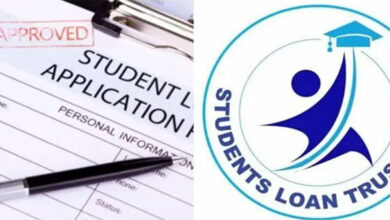Complete Overview Of The NTC Licensure Exams Since Inception
Here is a complete overview of the NTC Licensure Exams since its inception. It details all that has transpired since the exams was launched. It talks about what the entire NTC licensure is about, rationale behind the licensure exams, scope and target of the licensure exams, all about the first second and third editions of the exams, pass and failure rates, venues for all editions of the licensure exams, registration procedures and dates among others.
For detailed step by step procedure with detailed images and guidance on how to register for the NTC licensure exams September 2019 check the article below.
Recommended
- NTC Opens Registration For All Teachers To Get A License Without Taking Exams
- NTC Registration For All In Service Private And Public Sector Teachers
- NTC Licensure Exams Past Questions 2018/2019/2020
- Resit Registration For NTC Teacher Licensure Exams
- NTC Certificate Request Procedures
- Detailed NTC Registration Procedures
- Complete Overview Of The NTC Licensure Exams Since Its Inception
- A List Of All NTC Portals
- NTC Licensure Exams Resit Results Checking Procedures
- Reasons Why You Cannot Access NTC Exams Results
Table of Contents
About The NTC and The Licensure Exams
The National Teaching Council is mandated by the Education Act 2008 (Act 778), Section 9 to improve professional standing and status of teachers and to license and register teachers in Ghana.
Rationale Of The NTC Licensure Exam
The reason behind the teacher licensure examination is to enable qualified teachers to acquire a professional license to ply their trade and to also improve the state of teaching as well as to improve the quality of teachers in the country.
The purpose of the licensure examination is to enable qualified teachers to acquire a professional license, and also attract excellent young graduates from the Universities and Colleges of Education who have the required professional knowledge, skills and attitudes necessary to deliver effectively in schools.
Scope And Target Of The Licensure Exams
Teachers already teaching prior to the starting of the licensure examination in September 2019, both in public and private schools, would not be required to write the examination but would undertake a number of in-service professional training program to upgrade themselves to enable them to obtain the license. This process is yet to be done.
Targeted candidates for the exams are those who have completed colleges of education or those who read Education in the various universities and colleges who seek to be employed by the Ghana Education Service (GES).
The current policy is that all teachers and prospective teachers who seek to be employed by the GES would be required to write the licensure examination as directed by the NTC.
Three papers namely Professional Skills, Literacy and Numeracy are to be taken by the directions of the national teaching council.
A candidate is required to pass all three papers to acquire the teaching license. Should a candidate fail any paper, the candidate will not receive his or her teaching license until the candidate has resit and passed the paper in question.
All About The Maiden (First) Edition Of The Licensure Exams
Statistics: Pass and Failure Rate From The Maiden Edition

In the first edition of the licensure exams which took place between September 10 and September 12, 2018 saw candidates take three papers namely Professional Skills, Literacy and Numeracy.
Out of twenty-eight thousand seven hundred and fifty-seven (28,757) candidates who wrote the licensure examination, seven Thousand, Four Hundred and Thirty-Two (7,432) representing 26% failed.
While twenty-one thousand two hundred and eighty-seven (21, 287), representing 74% passed the licensure exams.
Out of fifteen thousand six hundred and forty-seven (15,647) males who wrote the maiden edition of the exam, three thousand five hundred and thirty-two (3,532) representing 23% of them failed.
While out of thirteen thousand one hundred and ten (13,110) females who took the maiden edition of the exam, three thousand nine hundred and thirty-eight 3,938 representing 30% of them failed.
The results of twenty-six (26) candidates were withheld pending the completion of investigations into their involvement in allege examination malpractice, while twelve (12) had their entire results cancelled.
Venue Of The Maiden Edition
The maiden edition of the licensure exams was held in all public colleges of education across Ghana with exception of Christ the Teacher college, Akim Oda Methodist college, St. Ambrose college, McCoy college, Cambridge college, Jackson college and Holy Spirit College of Education. The excluded colleges of education were mostly private colleges of education.
Initial Resistance Of The Licensure Examination

The licensure examination was initially resisted fiercely by some teacher unions and most of the newly trained teachers who threatened to hit the streets in protest after meetings upon meetings with their respective leadership.
The teacher trainees accused the national teaching council (NTC) of devising means to deny them employment. The teacher unions argued that the entire process including the time table for the examination as “hastily put together”.
However, the national teaching council (NTC) dismissed the allegations of the teacher unions. Saying that they had already embarked on enough sensitization exercises since 2016, to educate and consult all stakeholders including the Teacher Trainees Association Ghana (TTAG), the vice-chancellors and registrars of the universities, the Conference of Heads of Assisted Secondary Schools (CHASS), the Conference of District Directors of Education, among others.
The Executive Secretary of the NTC Dr Mrs Oduro explained that the rationale behind the licensure examination was not to prevent people from getting employment, as perceived by some students in the colleges of education.
It was after the meeting of the Minister of Education, Dr Matthew Opoku Prempeh with the teacher unions, that they to rescinded their decision and corporated.
Delay In Release Of Results Of The Maiden Edition
Amidst the misunderstanding between the NTC and the teacher unions, A group of trainee teachers called the Friends of Colleges of Education, headed to the Supreme Court to seek an injunction to prevent the maiden edition of the Teacher Licensure Exams from taking place on scheduled, Monday, 10 September 2018.
A flag bearer-hopeful of the main opposition National Democratic Congress (NDC), Elikpilm Agbemava, who served as the lawyer for the group, filled the suit on their behalf. But it was thrown out by the court and the exams proceeded.
Even after the unsuccessful injunction on the scheduled date of the maiden edition of the licensure exams, Mr Agbemava took a similar action at the Supreme Court.
He sought a declaration that; on a true and proper interpretation of Article 190 (1) (a) and (3) of the 1992 Constitution, the creation of the National Teaching Council, National Inspectorate Board and the National Council for Curriculum Assessment, is unconstitutional.
He also sought a declaration that; on a true and proper interpretation of Art 17 and 296 of the 1992 Constitution, the guidelines and procedures for the licensure examination for only newly-trained teachers, is discriminatory, arbitrary, an abuse of power and inconsistent with the 1992 Constitution and, therefore, unconstitutional.
He further sought a declaration that a “trained, qualified teacher” is a person who has sat and passed all the modules, contents and methodology of the various courses of the colleges of education as established by the Colleges of Education Act, 2012 and certified by the University of Cape Coast or the National Accreditation Board National Teaching Council’s and “registered” by the Ghana Education Service as a person qualified to teach at the pre-tertiary level and not by virtue of any licensure exam supposedly organised by the National Teaching Council established under the Education Act, 2008 (Act 778), as amended.
All these court actions unduly delayed the release of the results for about five months amidst fears that that the entire licensure examination might be squashed by the court.
However the supreme court threw out the case and the ntc licensure exams in the process had legal backing.
The results for the maiden edition was then released in February 2019.
Outcry On The Massive Failure Rate
The past deputy general secretary of the Trainee Teachers Association of Ghana (TUTAG), Mr Ekow Painstil Gyan, expressed worry about the massive failure rate of the maiden edition of the licensure exams.
He made his views known on Citi FM on 11 March 2019 still taking the stance that the opposing teacher unions took against the hasty nature of the maiden edition.
“You saw that we raised a lot of concerns about the mode of assessment for the examination, especially when no material was available or no material was provided for candidates to read before they wrote the examinations, and, so, it was clear, we saw it coming that a lot of people were going to fail.
“And even if you contact others, you’ll note that those who failed the examinations are students or people who studied, who read early childhood and if you go to college and learn more about early childhood, you don’t learn anything about mathematics, yet they brought mathematics questions for those who studied early childhood and even those who studied French to answer”.
“You can’t ask someone to go and sit down without giving that person a course outline to study, no it is wrong”.
Examination Malpractices
There was unprecedented instances of examination malpractice in the maiden edition of the licensure exams, way more than one would expect from an exam of that nature.
This led to the credibility of the whole process being questioned especially by those who initially opposed the licensure exams.
The malpractice was mostly due to delays and lack of synchronization of the starting time across the country. There were instances where people started the exams over 30 minutes late than other center.
This led to the questions being snapped on smart phones and distributed across social media platforms.
Good thing is the national teaching council (NTC) got it right the second edition. There was arguably no instance of malpractice at all.
This was mostly due to synchronization of starting times across venues and propably the involvement of WAEC in the examination process. As venues for the second edition of the exams was restricted to WAEC exams centers across the country instead of colleges of education.
All About The Second Edition Of The Licensure Exams
The second edition of the national teaching council (NTC) licensure exams begun registration around 17th march 2019, the registration lasted a week. After which the exams was taken on 25th and 26th march 2019.
Out of the twelve thousand and seventy-six (12,076) candidates who sat for the licensure exams, eight thousand and eighty-nine (8,089) representing 67% passed.
While three thousand nine hundred and eighty-seven (3,987) candidates representing 33 per cent, failed.
Out of the six thousand five hundred and thirty-three (6,533) males who wrote the exams, 1,657 representing 25% failed, while 4879 representing 75% of them passed the exam.
Out of five thousand four hundred and ninety five (5,495) females who wrote the licensure exams, two thousand three hundred and five 2,305 representing 42% failed while three thousand one hundred and ninety (3190) representing 58% passed.
Venue Of The Second Edition Of The Exams
Venues for the second edition of the licensure exams was restricted to WAEC exams centers across the country instead of colleges of education. This helped prevent malpractices due to the synchronization of starting times across venues.
All About The Third Edition Of The Licensure Exams
The National Teaching Council (NTC) has set first week of September 2019 for registration and 24th to 26th September 2019 as dates for writing the third edition of the teacher licensure exam. Note that the 24th and 26th September is subject to change. This has been the norm. However changes would be communicated by the NTC through its appropriate channels.
An estimated 15,000 candidates are expected to take the exam. This would include those who could not take part in the maiden and second edition of the licensure exams and as well as the those who failed in both editions of the exams.
Venue For The Third Edition Of The Licensure Exams
The venues of the third edition for the licensure exams is yet to be confirmed by the national teaching council (NTC). It could be colleges of education as was done last year. So as not to bring inconvenience to teacher trainees due to their large numbers involved.
It could also be WAEC centers as was done with the second edition of the licensure exams. It is good to note that the numbers for the second edition was very small compared to the first edition. And the third edition would be even more.









I need past/sample questions
Search for NTC past questions on google and you will see our site there with past questions
What about teachers who just registered these year
please I need the link for online registration.
https://avenuegh.com/register-national-teaching-council-licensure-exams/
Please where can we get our certificates, I mean those who wrote the first exams. 2018.
NTC Office In Accra